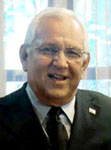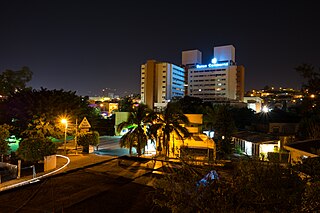
Politics of Honduras takes place in a framework of a multi-party system presidential representative democratic republic. The President of Honduras is both head of state and head of government. Executive power is exercised by the government. Legislative power is vested in the National Congress of Honduras. The party system is dominated by the conservative National Party of Honduras, the Liberal Party of Honduras, and Liberty and Refoundation.

Honduras is a member of the United Nations, the World Trade Organization (WTO), the Central American Parliament (PARLACEN), the Central American Integration System (SICA), and the Central American Security Commission (CASQ). During 1995-96, Honduras, a founding member of the United Nations, for the first time served as a non-permanent member of the United Nations Security Council. Honduras is also a member of the International Criminal Court with a Bilateral Immunity Agreement of protection for the US-military.

Carlos Roberto Reina Idiáquez was a Honduran politician, lawyer and diplomat who served as the President of Honduras from 1994 to 1998. He was a member of the Honduran Liberal Party.
Knowledge Bowl is the name for several interdisciplinary academic quiz bowl-like competitions across the United States and the world. The questions for many Knowledge Bowl competitions are supplied by the Academic Hallmarks company of Durango, Colorado.

Carlos Roberto Flores Facussé is a Honduran politician and businessman who served as the President of Honduras from 1998 to 2002. A member of the Liberal Party, Flores was previously the President of the National Congress from 1994 to 1998.

Ocotepeque is a municipality in the Honduran department of Ocotepeque. The town of Nueva Ocotepeque is the municipal seat and the capital of the department.

The Francisco Morazán Stadium is one of the three stadiums available to the city of San Pedro Sula, Honduras. It is an official stadium for games of the National League of Professional Football in Honduras and international matches and international competitions of the Confederation of North, Central America, and Caribbean Association Football (CONCACAF) and FIFA.

Association football in Honduras is a national sport. It is the most popular sport among Hondurans, becoming popular in the 20th century. Honduras performed memorably in three World Cups, Spain 1982, South Africa 2010, and Brazil 2014. The nation also competes in the Copa America, UNCAF Nations Cup, Olympic Games, and in FIFA U-20 World Cups. Its national team team is considered the strongest football team in central America alongside Costa Rica.
Mazapan School is a N-12 co-educational bilingual school offering a US-style college preparatory instruction program. Owned and operated by Standard Fruit de Honduras (Dole), Mazapan School is located in La Ceiba, Honduras. Founded in 1928, the landscaped campus is located on 5 acres (20,000 m2). The 300+ students attending Mazapan School are taught in English and Spanish, and receive a U.S. High School diploma and a Honduran Baccalaureate degree.

Roberto Micheletti Baín is a Honduran politician who served as the interim president of Honduras from 28 June 2009 to 27 January 2010 as a result of the 2009 Honduran coup d'état. The Honduran military ousted the President, and the National Congress read a letter of resignation, which was refuted two minutes later by Zelaya in conversation with CNN en Español; days later, the coup-plotters claimed that the Supreme Court had ordered to forcefully detain President Manuel Zelaya because "he was violating the Honduran constitution"; Zelaya was exiled rather than arrested. Micheletti, constitutionally next in line for the presidency, was sworn in as president by the National Congress a few hours after Zelaya was sent into exile by the Honduran military. He was not acknowledged as de jure president by any government or international organization. The 2009 general election took place as planned in November and elected Porfirio Lobo Sosa to succeed Micheletti.
The Country Day School Costa Rica (CDS) is a school in San Rafael de Alajuela, Costa Rica.

The history of the Jews in Honduras begins in the colonial period, during the proceedings of the Inquisition with the arrival of sephardic Jews to Honduran soil. As of April 2020, in Honduras there are 390 Jews who have gained the Honduran residence. Honduran Jews are able to practice Judaism peacefully and are included in Honduran politics and culture. The Jewish community is primarily concentrated in Tegucigalpa and San Pedro Sula, where there are synagogues. Honduras was one of the first countries to recognize the State of Israel, in 1948, and the Jewish community in Honduras has benefited greatly from Israeli aid.
DelCampo School (DCS) is a private school located in the region of Tegucigalpa, Honduras. DCS is also a college preparatory school with English and Spanish as the primary languages of instruction. The program of study offers students the opportunity to graduate with an American high school diploma as well as the "Bachillerato" degree, which fulfills requirements of the Honduran Ministry of Education.

The 2009 Honduran coup d'état, which took place during the 2009 Honduran constitutional crisis, occurred when the Honduran Army, following orders from the Honduran Supreme Court, ousted President Manuel Zelaya on 28 June 2009 and sent him into exile. Zelaya had attempted to schedule a non-binding poll to hold a referendum on convening a constituent assembly for writing a new constitution. Despite court orders to cease, Zelaya refused to comply, and the Honduran Supreme Court issued a secret arrest warrant dated 26 June. Two days later, Honduran soldiers stormed the president's house in the middle of the night, detained him, and thwarted the poll. Instead of putting him on trial, the army put him on a military plane and flew him to Costa Rica. Later that day, after reading a resignation letter of disputed authenticity, the Honduran Congress voted to remove Zelaya from office and appointed Head of Congress Roberto Micheletti, his constitutional successor, to complete his term. This was the first coup to occur in the country since 1978.

Tegucigalpa —formally Tegucigalpa, Municipality of the Central District, and colloquially referred to as Tegus or Teguz—is the capital and largest city of Honduras along with its sister city, Comayagüela.

Miguel Facussé Barjum was a Honduran businessman and landowner. He was Executive President of Corporación Dinant, a consumer products manufacturing company he founded in Honduras in 1960. Dinant sells its products throughout Central America and the Dominican Republic, and also exports to global markets. A 2006 study by the Friedrich Ebert Foundation named Facussé one of the three "most powerful men in Honduras". Facussé was the chief economic advisor to President Roberto Suazo Córdova during his term in office from 1982 to 1986 and vice-president of APROH, a "right-wing grouping of business interests and members of the armed forces" from the early 1980s to at least 2001. Facussé was married and had nine children. His nephew, Carlos Roberto Flores, was President of Honduras from 1998 to 2002. His son-in-law, Fredy Nasser, is a prominent Honduran businessman. In May 2009, Facussé was awarded the Orden Mérito a la Democracia en el Grado de Gran Caballero by the Senate of Colombia. In August 2014, he was awarded the CEAL Founders' Award for his pioneering role in promoting business between Latin American nations.

Honduras–Mexico relations are the diplomatic relations between Honduras and Mexico. Both nations are members of the Association of Caribbean States, Community of Latin American and Caribbean States, Organization of American States, Organization of Ibero-American States and the United Nations.

Berta Isabel Cáceres Flores was a Honduran (Lenca) environmental activist, indigenous leader, and co-founder and coordinator of the Council of Popular and Indigenous Organizations of Honduras (COPINH). She won the Goldman Environmental Prize in 2015, for "a grassroots campaign that successfully pressured the world's largest dam builder to pull out of the Agua Zarca Dam" at the Río Gualcarque.

Honduras-Italy relations refer to bilateral relations between Honduras and Italy. Honduras has an embassy in Rome. Italy has a non-resident ambassador based in Guatemala City accredited to Honduras.













